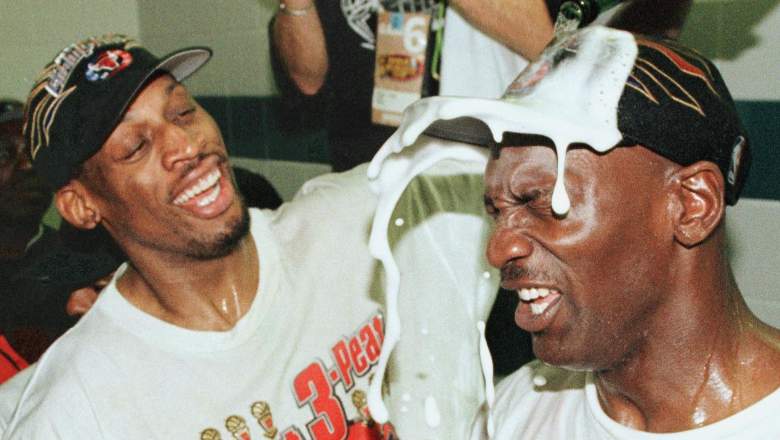
Getty Michael Jordan, at right, doused with Champagne by teammate Dennis Rodman in 1998
During the course of his career, especially after he began leading the Chicago Bulls to championships in the 1990s, Michael Jordan earned his reputation for toughness. He was tough on opponents, especially in the playoffs—he won 25 of his final 26 postseason series—but he could be tough on teammates, too. He had a reputation for pushing guys he thought were underperforming, to either get them ready for the trials that he knew would be ahead or to show coaches that the player in question could not handle pressure.
Because of that, Jordan was reluctant to get involved with the ESPN mega-project, The Last Dance, a 10-part documentary about the final season of the Bulls dynasty that will be unveiled next week.
As director Jason Hehir told Richard Deitsch of The Athletic, Jordan initially turned down the project. He used Scott Burrell, the former Connecticut star who was a four-year NBA veteran when he joined the Bulls for the 1997-98 season, as his example. Jordan prodded and rode Burrell throughout the year, especially in practice.
Hehir recounted Jordan’s thoughts to Deitsch. “When you see the footage of it,” Jordan told Hehir, “you’re going to think that I’m a horrible guy. But you have to realize that the reason why I was treating him like that is because I needed him to be tough in the playoffs and we’re facing the Indianas and Miamis and New Yorks in the Eastern Conference. He needed to be tough and I needed to know that I could count on him. And those are the kind of things where people see me acting the way I acted in practice, they’re not going to understand it.”
Jordan Explains Being a ‘Tyrant’ in Practice
That was a theme throughout Jordan’s career, especially when he turned the corner from high-scoring star who could not get past the Detroit Pistons in the 1980s to nearly unbeatable superhero with the juggernaut team in the 1990s.
In a scene from the seventh episode of the series, Jordan explains that mentality. He pointed out that, yes, he did demand much from his teammates, but he himself did everything he was demanding of them. He said he understands he might look like a, “tyrant,” in the documentary, but that was necessary to win. Jordan explained:
“Look, winning has a price. And leadership has a price. So I pulled people along when they didn’t want to be pulled. I challenged people when they didn’t want to be challenged. And I earned that right because my teammates who came after me didn’t endure all the things that I endured. Once you joined the team, you lived at a certain standard that I played the game. And I wasn’t going to take any less. Now if that means I had to go in there and get in your ass a little bit, then I did that. You ask all my teammates. The one thing about Michael Jordan was he never asked me to do something that he didn’t fucking do. When people see this they are going say, ‘Well he wasn’t really a nice guy. He may have been a tyrant.’ Well, that’s you. Because you never won anything.
Jordan’s Trainer: ‘He Never Cared About Being Liked’
When Jordan said he has not asked teammates to do anything he has not done, he certainly has history to fall back on. In the late 1980s, tired of getting physically battered by the Pistons’ “Bad Boys” teams, Jordan joined forces with Chicago trainer Tim Grover and remade his body, getting up for intense, hours-long morning workouts at his house before the team’s practices began.
For my book released in 2014, Facing Michael Jordan, Grover told me that Jordan did not much care about being liked.
“I called him a black cat because of the effect he had when he crossed your path,” Grover said. “It was not going to be a good thing for you. He would go into the opponents’ locker room before games to talk to someone, and he would just change the dynamic in there. It is a fear and respect thing. He never cared about being liked; he did not need to be friends with everyone all over the league. He did want to be feared and respected, though. That was important.”
Maybe some will think Jordan is a, “horrible person,” after seeing the documentary. Maybe he will come off as a tyrant and not be well-liked. But he won six championships by being so demanding—it’s a pretty good trade-off.
READ NEXT: Shaq: Lakers’ Dynasty Would ‘Easily’ Topple Jordan’s Bulls